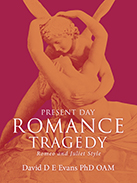
 |
When the author saw “a report in the early 90’s, of an Indian man who hanged his son in public in front of the village temple,” he began following other reports of the phenomenon of honor killing. In this study, Evans tackles the traditional taboos and punishments placed on sons and daughters who follow their hearts and refuse to succumb to archaic beliefs. The author traces historical romance tragedy works with Romeo and Juliet as a well-known example of such. He continues with a discussion of modern-day romance tragedy, specifically in India. Other chapters look at romance tragedy as expressed in the arts, romance tragedy and social theory, progress in challenging the tradition, and key literature. The second part of the book discusses the importance of nonkilling on both the personal and global level, followed by appendices that present original news reports of honor killings.
This study is an enlightening work. “The issue at hand in romance tragedy is a compilation of pride, honour, and shame. Murder, suicide, leaving the scene, and cutting off relationships are all seen in romance tragedy.” The use of Romeo and Juliet as the central literature is fascinating as the author includes Shakespeare’s source for the play, as well as other works of literature not commonly known in the West. The tragic stories of couples who have been killed or committed suicide may seem inconceivable to modern readers in the West. The author’s desire to present solutions to these tragic events is evident. He should be commended for bringing these issues to light in this intriguing study and for including the work of organizations such as The Global Centre for the Responsibility to Protect. This is a compelling and unforgettable work that could be a significant source for sociology courses and discussion groups.
RECOMMENDED by the US Review